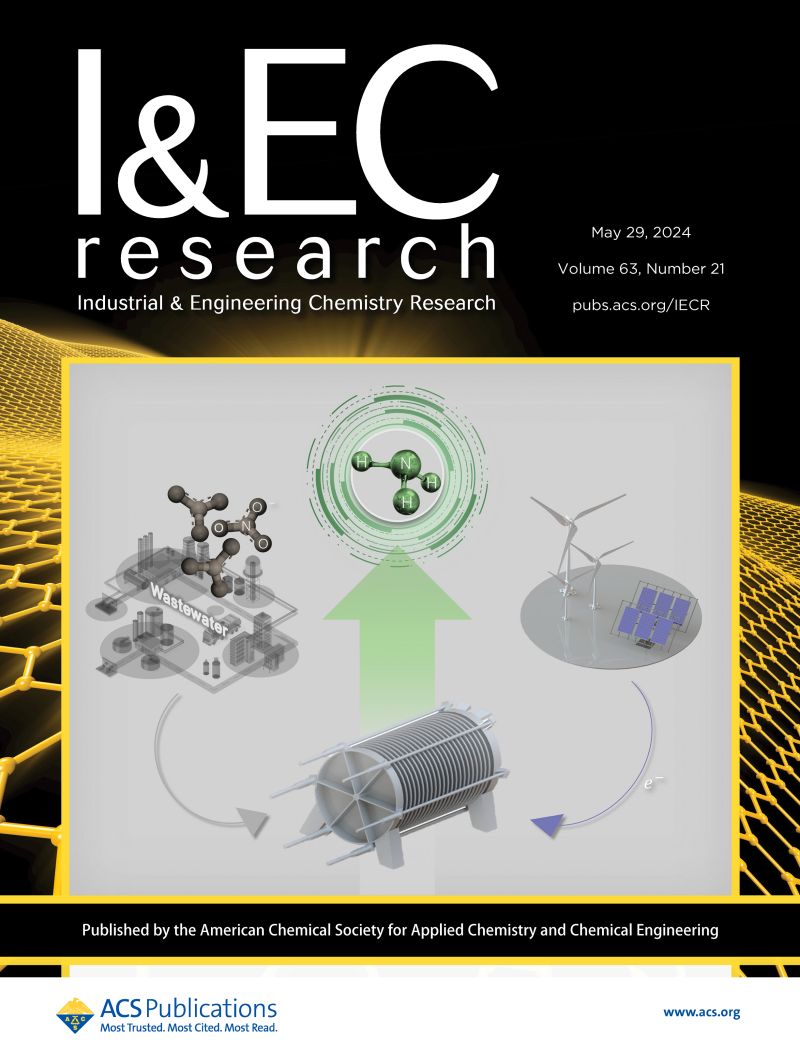Highly Efficient Glycolysis of Polybutylene Terephthalate to Value-Added Monomers Catalyzed by 1,4-Butanediol Dispersions of Ultrasmall Zinc Oxide Nanoparticles
IF 3.8
3区 工程技术
Q2 ENGINEERING, CHEMICAL
引用次数: 0
Abstract
The escalating global demand for poly(butylene terephthalate) (PBT), as one of the five major engineering plastics, has led to severe ecological crises and significant resource consumption. In this work, we employ 1,4-butanediol dispersions of ultrasmall zinc oxide nanoparticles (ZnO NPs) with an average size of 2.8 nm and excellent dispersity as catalysts for the highly efficient glycolysis of PBT using 1,4-butanediol. Specifically, complete depolymerization of PBT and approximately 98% yield of bis(4-hydroxybutyl) terephthalate (BHBT) are achieved within 45 min at 200 °C by only a minimal amount of ZnO NPs (0.1 wt %). More importantly, 95% PBT conversion can still remain after five cycles, exhibiting high recyclability of ZnO NPs. The possible reaction mechanism for glycolysis of PBT in 1,4-butanediol over ZnO NPs is proposed, and the reaction kinetics is also studied with an activation energy of 149.7 kJ/mol. Furthermore, ZnO NPs also show outstanding catalytic activity in the methanolysis of PBT, reaching over 97% yield of dimethyl terephthalate (DMT) within 60 min at 160 °C. This work provides a sustainable pathway for efficient recycling and reuse of PBT and broadens its market prospect.

1,4-丁二醇分散的超小氧化锌纳米颗粒催化聚对苯二甲酸丁二醇高效糖酵解制备高附加值单体
聚对苯二甲酸丁二醇酯(PBT)是全球五大工程塑料之一,其不断增长的需求导致了严重的生态危机和资源消耗。在这项研究中,我们采用平均粒径为 2.8 纳米、分散性极佳的超小氧化锌纳米粒子(ZnO NPs)的 1,4 丁二醇分散体作为催化剂,利用 1,4 丁二醇对 PBT 进行高效糖解。具体来说,只需极少量的 ZnO NPs(0.1 wt %),就能在 200 °C 下 45 分钟内实现 PBT 的完全解聚和约 98% 的对苯二甲酸二(4-羟基丁基)酯(BHBT)产率。更重要的是,经过五个循环后,95% 的 PBT 转化率仍能保持不变,这表明氧化锌氮氧化物具有很高的可回收性。研究还提出了 ZnO NPs 在 1,4-丁二醇中乙二醇化 PBT 的可能反应机理,并研究了反应动力学,其活化能为 149.7 kJ/mol。此外,ZnO NPs 在 PBT 的甲醇分解过程中也表现出卓越的催化活性,在 160 °C 下 60 分钟内对苯二甲酸二甲酯(DMT)的产率超过 97%。这项工作为高效回收和再利用 PBT 提供了一条可持续的途径,并拓宽了其市场前景。
本文章由计算机程序翻译,如有差异,请以英文原文为准。
求助全文
约1分钟内获得全文
求助全文
来源期刊

Industrial & Engineering Chemistry Research
工程技术-工程:化工
CiteScore
7.40
自引率
7.10%
发文量
1467
审稿时长
2.8 months
期刊介绍:
ndustrial & Engineering Chemistry, with variations in title and format, has been published since 1909 by the American Chemical Society. Industrial & Engineering Chemistry Research is a weekly publication that reports industrial and academic research in the broad fields of applied chemistry and chemical engineering with special focus on fundamentals, processes, and products.
 求助内容:
求助内容: 应助结果提醒方式:
应助结果提醒方式:


